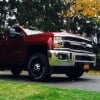- 0
Big mpg diff between DIC & manual calc on 04 duramax
-
Recently Browsing 0 members
- No registered users viewing this page.
-
Forum Statistics
246k
Total Topics2.6m
Total Posts -
Member Statistics
-
Who's Online 29 Members, 1 Anonymous, 1,933 Guests (See full list)














Question
Babyhauler
This is on my new to me 04 2500HD 4x4, crew cab, Duramax, 195,000 miles. Edge tuner set on mileage, dual exhaust w cat delete, Bully dog cai, 265-75-16 BFG AT tires. Runs & drives fine.
My first tank of fuel was showing 16.9 mpg at fill up. Hand calc indicated 12.4 mpg. Big difference. My many other chevy trucks & Tahoes would usually be about .6-1.0 mpg higher than manual calc. I have never had one be this far off. Is the tuner causing this or some other setting? The fuel guage fell really fast after 1/3 left. I don't know if that has anything to do with it or not. I don't think so.
Let me know if there is a solution for this big difference.
Thanks for the help.
Link to comment
Share on other sites
13 answers to this question
Recommended Posts
Archived
This topic is now archived and is closed to further replies.